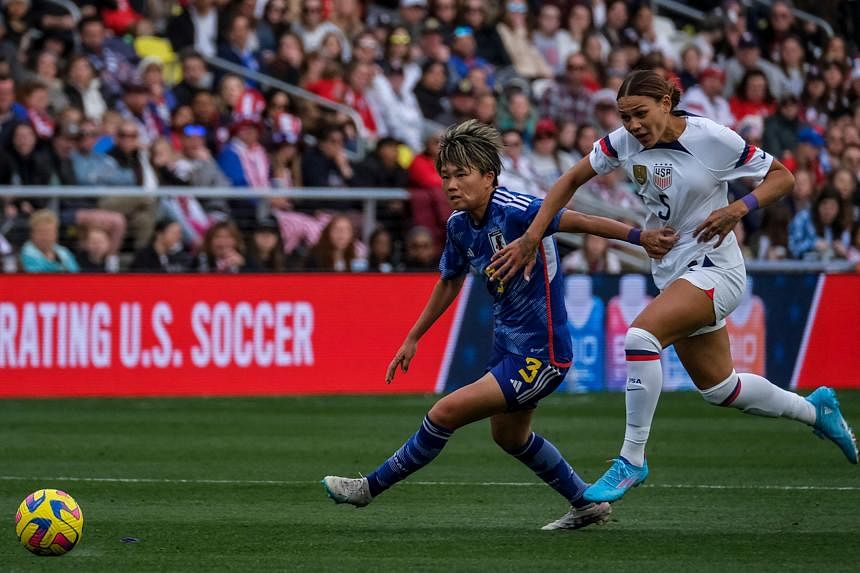CHIBA – Japan defender Risa Shimizu is hoping that by focusing on every tiny detail of the game, the Nadeshiko can erase the memory of their disappointing 2019 campaign and make a mark at the July 20-Aug 20 Women’s World Cup.
She started all of her country’s matches in France four years ago, where Japan came second in their group and bowed out in the last 16 after a 2-1 loss to eventual finalists the Netherlands.
That was a bitter return for Asia’s standard-bearers, who had beaten the United States to win the World Cup in 2011 and lost to the Americans in the final four years later.
“It was really frustrating in 2019, so this time I feel that I have to do better,” said the 27-year-old.
“For the World Cup, I think from now on we need to bring ourselves to perfection, and really pay attention to the details.”
Shimizu, who plays her club football for West Ham United in England, is known for her work rate, overlapping runs down the flanks and pinpoint crosses.
Strong technical skills have always been a strength of Japanese women’s football but Shimizu feels the Nadeshiko need to drill down even further to prepare for the World Cup, which kicks off in Australia and New Zealand on Thursday.
“Today we practised throw-ins,” she added. “We want to focus on such actions and make it perfect so that we can go to the World Cup as a competitive team.”
Another stalwart from the 2019 campaign, Hina Sugita, who plays for Portland Thorns in the United States, believes Japan will be competitive if everyone is at the top of their game.
“I want nothing more than to win our games and advance to the next stage,” said the midfielder. “It’s not going to be easy to win, so everyone needs to put on their best performance.”
Starlet Jun Endo, 24, hopes to inspire the next generation, like how watching the world champions of 2011 when she was just a girl proved a “turning point” for her.
“I couldn’t play football because of the effects of the (Fukushima nuclear) disaster but just when I was thinking of quitting, Japan won the World Cup,” said the Fukushima native.
“I watched that and I strongly felt that I wanted to be standing in that position one day too... I had felt the fun going out of football, so to see players doing what I wanted to do – winning the World Cup – it had a really positive impact on me.”
However, the head of Japan’s professional women’s football league said support still lags behind other countries, even as global interest is rising.
Haruna Takata, who chairs the two-year-old WE League, said: “In Japan, the tendency is particularly strong to focus on the visual appeal and cuteness of female sports players. No matter how much football’s competitiveness improves, it’s hard to get people to feel interested in that aspect of it.”
Japan have been drawn with Spain, Costa Rica and Zambia in Group C.
While Japan remain Asia’s standard-bearers, South-east Asian sides Vietnam and the Philippines are joining the party for the first time.
It was with great fulfilment that Vietnam qualified ahead of their fiercest rivals, Thailand. But gratification comes with burdensome pressure to avoid embarrassing performances, such as the Thai’s 13-0 loss to US at the last World Cup.
The Vietnamese have been drawn in a treacherous group, featuring two-time defending champions the US, the Netherlands and Portugal.
“We witnessed the fiasco, and it’s a lesson learnt for Vietnam,” said Huynh Nhu, the team’s star forward. “Thailand suffered such a big loss, they just kind of fell backward, and their fighting spirit is no longer there. No matter what happens against the United States and other powers, we will keep fighting.”
But in their last World Cup warm-up, the Vietnamese lost 9-0 to a Spain side who are missing several of their stars.
She and coach Mai Duc Chung have told local media that they are struggling to adapt to the chilly weather in New Zealand.
That might be less of an issue for South-east Asian counterparts, the Philippines, as the bulk of their players have been recruited from the nation’s large diaspora – such as US-born Sarina Bolden, Norwegian-born Sara Eggesvik and Canadian-born Jackie Sawicki.
The Philippines have been handed a kinder draw, facing out-of-form co-hosts New Zealand, a Norway side who are winless in their last four matches and Switzerland, who are without a victory in six games.
US-born attacker Quinley Quezada told the Philippine Daily Inquirer: “I think from the start, we (have been) really organised and disciplined on defence. We’re very, very organised. And it’s (being done) collectively in our back four, midfield and starting with our forwards. So I would just say that we are very organised.” REUTERS, AFP, NYTIMES, BLOOMBERG

